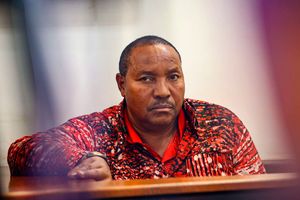
The fundamental question to ask is whether these cases handled by the fake lawyers have been won fairly through the due process or they bought their wins.
Our Columnists
Premium
Do fake lawyers win or ‘buy’ cases?
Following the news that a person has been impersonating a lawyer in court and even won all his cases thus far, posts on X (formally Twitter) social media platform showed how Kenyans were divided on the matter.
The legal-minded Kenyans, including Law Society of Kenya (LSK) officials, drew blood and wanted the person prosecuted for the offence. There was the other army, comprised mostly of people with credibility issues and tribalists throwing a ring of steel around the impersonator.
I stand with the legal-minded group on the issue and say that it is not a laughing matter to impersonate a lawyer. There are grave consequences to parties in a dispute, the due process and the legal profession.
Many Kenyans did not see why the person in question is to be prosecuted while the likes of Senator Okiya Omtatah have been able to bring civil cases to court with no ramifications. But there is a day light between the work of Omtata and the impersonator.
First, the latter deliberately passed himself off as a lawyer. Secondly, there is no proof that the man had made it clear that he was in court not as a qualified lawyer but a representative of clients on amicus curiae basis. Amicus curiae, or ‘friend of the court’, is a role that can be played by anyone to help the court in a legal process.
It is also possible for a person who is not a lawyer to bring cases to court but only if it is a matter affecting him or her and must make it clear to the court that s/he intends to represent himself or herself.
Once a person has impersonated himself or herself as a professional with intention to reap material or financial benefit as that professional without the requisite qualification, then it becomes legally problematic for the impersonator. Due process must, in this case, take place—and without another fake lawyer, of course!
Being a lawyer is not about speaking a lot of English or bullying or ‘buying’ the court to a win but being able to discuss and challenge legal issues in a professional, knowledgeable and calm manner. It takes lawyers years of study and practice to perfect the art of being a lawyer.
A con could do it in 24 hours and flounder through the process. That is their art. However, in the cases of people impersonating lawyers in Kenyan courts, the fundamental question to ask is whether these cases have been won fairly through the due process or they bought their wins. After all, in Kenya, there is a saying that goes, “Why pay a lawyer if you can buy a judge?”
Highest bidder
Given that we have resigned ourselves to the fact that justice has always belonged to the highest bidder who can afford to bribe the judge, the recent events where fake lawyers have been outed by LSK begs the question whether there is rampant malpractices and bribery in the justice system.
These incidents highlight the lack of robust scrutiny within the justice system or, perhaps, all the professional bodies in Kenya. We are now familiar with the presence of fake doctors and pharmacists, but how many fake engineers are building the houses collapsing all around us, or fake police disappearing Kenyans?
The problem of impersonating professionals or floods of fake academic documents is right at the heart of the rot within the professional bodies and government institutions tasked with the job of issuing academic papers and practice certificates.
The problem starts at the top, in the way the ruling class has conducted itself. Many occupy high positions in government even after failing the integrity test as per Chapter Six of the Constitution, on Ethics and Integrity. It may seem a harmless practice for political parties, as they have got their men and women to rely on to do their dirty bidding in politics, but the misbehaviour trickles down to the rest of society and it then becomes the norm to behave in an unethical fashion.
Sadly, once caught, as has been the case with fake lawyers, individuals who had no moral bones in their DNA as politicians find no fault in standing up for crooks.
The merits and demerits of fake professionals is a discussion that should not even be taking place if every institution that is legally mandated to protect the public interest did their job as per the rule book. But here we are, picking up the pieces after mutilating the ethos of the ethics and integrity rule.
The exercise should not stop at jailing those impersonating professionals but by reviewing all the cases they won. The wins by fake lawyers should not be allowed to stand, lest a party has been unfairly aggrieved. In the same breath, Kenya must now establish a Case Review Board, which would be tasked to reconsider cases retrospectively for the sake of justice.
As we have witnessed, fake lawyers, and corrupt ones and judges, have become the biggest stumbling block to access to justice by ordinary Kenyans. The justice system needs to be scrutinised and remedied where necessary.
- Ms Guyo is a legal researcher. [email protected]. @kdiguyo





